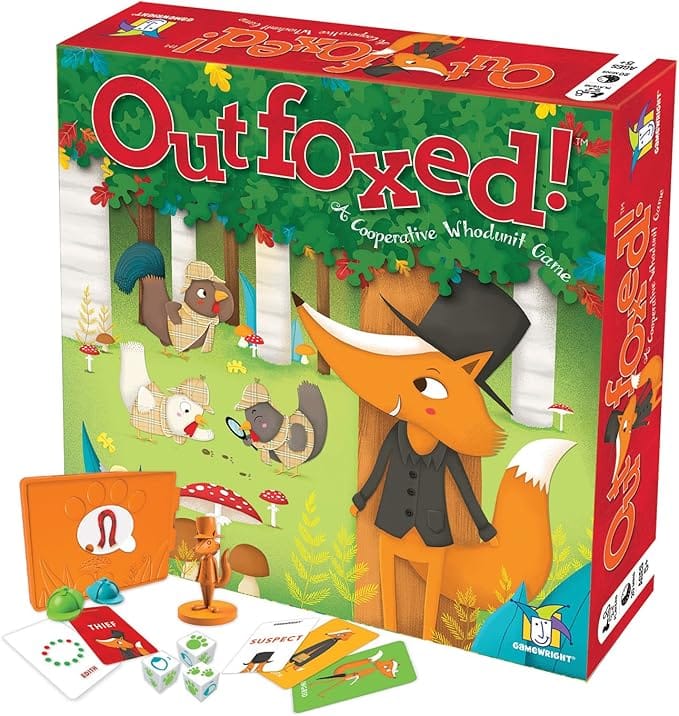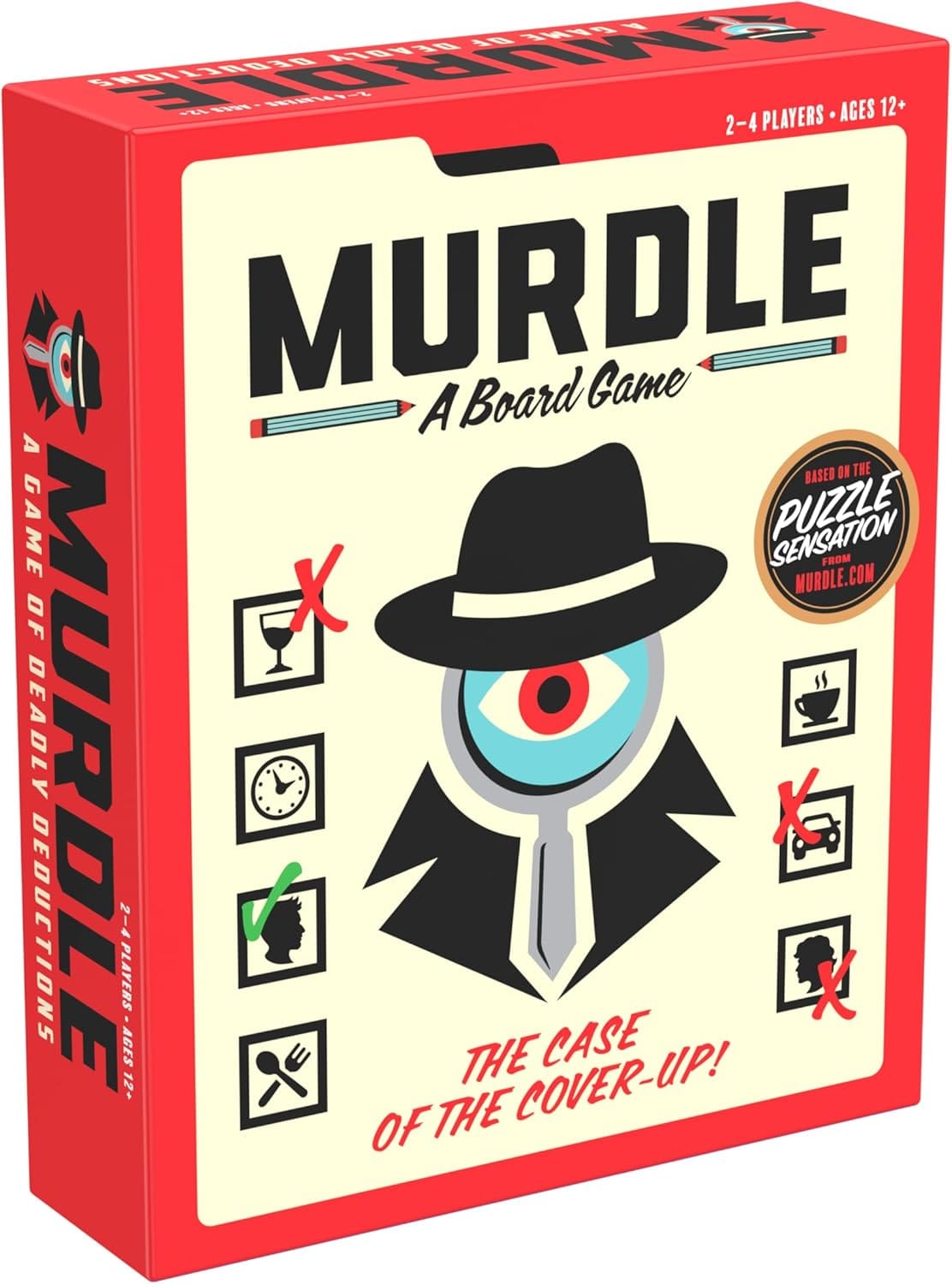Murdle: When logic puzzles become family chaos
We bought Murdle for Sam as a Father's Day gift - logic puzzles transformed into a competitive board game. What followed was family chaos: recording errors, wrong solutions, and my spectacular elimination. But we all want to play again.

A Father's Day gift that tested everyone's deductive reasoning and patience
We bought Murdle for Sam as a Father's Day gift - something we could play together as a family. The premise appealed to me immediately: logic puzzles transformed into a competitive board game. As a child, I devoured activity books full of these puzzles. They were probably my favorite kind of brain challenge.
What I didn't anticipate was how differently four people could interpret the same clues, or how quickly logical deduction could become family drama.
The Setup
Murdle takes the classic grid-based logic puzzles and turns them into a race. Each player gets their own deduction grid, and everyone works from the same shared clues revealed on the main board. The goal is to figure out who committed the murder, with what weapon, and where.
Our 4-year-old helped me with my grid, which added an interesting collaborative element. Sam, myself, and the two older kids all started with different levels of familiarity with logic puzzles. I had childhood experience. Others were learning the methodology on the fly.
Where It Went Wrong (And Right)
We dove in enthusiastically, marking our grids and discussing possibilities. The game moved at a good pace until we reached that moment familiar to anyone who's done logic puzzles: something didn't add up.
Someone's private deduction grid contradicted information on the main board. It was upsetting for them to discover the conflict, thinking it was their error. But we quickly realized it was actually an error on the main board. And now multiple people had made recording errors or logical missteps.
Rather than backing up carefully, I went big and presented a complete solution. Which was wrong. And which, according to the game rules, excluded me from continuing.
We did eventually reach the correct answer, with everyone's brains feeling slightly fried. But we got there.
What The Game Actually Provides
For Logic Puzzle Veterans: The competitive element adds urgency to familiar mechanics. Instead of leisurely working through clues, you're racing against other players while trying to maintain accuracy.
For Logic Puzzle Newcomers: The game introduces these puzzle types in a social context where questions can be asked and mistakes discussed. Learning together reduces the intimidation factor.
For Mixed Groups: This is where it gets interesting. Different comfort levels with logical deduction create great skill-building opportunities, but also potential frustration when some players work faster than others.
Comparison Point: Outfoxed
If you're considering Murdle for a family with younger children, Outfoxed might be the better choice. It uses similar deductive reasoning but in a cooperative format where everyone works together rather than competing. The pressure is distributed differently, and mistakes become shared problems to solve rather than individual errors that knock you out of the game.
Outfoxed also has clearer visual cues and simpler board management, making it more accessible for developing logical reasoning skills.
The Recovery Test
A week or two has passed since our chaotic Murdle experience, and here's the telling detail: we're all keen to play again.
Despite the frustration, the brain strain, and my spectacular wrong-answer elimination, everyone wants another attempt. The challenge, though demanding in its unfamiliarity, felt good. We learned how the game works, how our different thinking styles interact, and where we need to be more careful with our deduction tracking.
What I Learned About Family Gaming
Different people process logical information differently. What seems obvious to one player may be completely unclear to another, even when working from identical information.
Mistakes compound quickly in logic puzzles. One small recording error early in the game can cascade into larger problems that become difficult to trace back and correct.
Competitive deduction creates different pressure than collaborative deduction. The race element changes how carefully people check their work.
Learning curves vary dramatically. Childhood familiarity with logic puzzles gave me an advantage that wasn't immediately obvious until we started playing. But, on the other hand, maybe my overconfidence meant I underestimated my own learning curve and the tricky shift from 2D to a more 3D experience.
The Practical Assessment
Setup Time: Moderate - distributing grids and explaining rules takes a few minutes
Play Time: 20-30 minutes depending on puzzle complexity and group speed Player Count: 2-4 works well, though 3-4 creates more interesting competitive dynamics
Replayability: High - multiple puzzle scenarios included
Frustration Potential: Significant for players new to logic puzzles or those who make early errors
Who This Game Serves
Logic Puzzle Enthusiasts: Familiar mechanics with added social competition Patient Family Groups: Willing to work through learning curves and mistakes together
Older Children/Teens: Developing logical reasoning skills and comfortable with competitive elements
Adults Who Enjoy Mental Challenges: Seeking games that exercise deductive reasoning
Who Might Struggle
Younger Children: Grid management and abstract logical relationships may be challenging
Impatient Players: Mistakes require backtracking and discussion
Groups With Very Different Skill Levels: Can create frustration for both faster and slower players
The Verdict
Murdle succeeds at transforming solitary logic puzzles into social experiences. The competitive element adds urgency and excitement, though it also amplifies the consequences of mistakes.
Our chaotic first game, complete with errors, eliminations, and eventual success, felt like exactly what this type of game should provide: a challenge that pushes everyone's thinking while creating shared stories about the process.
The fact that we're all eager to play again, despite (or perhaps because of) the brain strain, suggests Murdle hits the right balance of challenge and accessibility.
Just be prepared for some trial and error as everyone learns to manage both the logical deduction and the pressure of competition.
Where to buy
This isn't a tricky to get your hands on premium board game. We picked up our copy of Murdle at the local Big W.
Outfoxed has been around for a while and may be harder to find. You're probably more likely to track that down at a dedicated games or puzzles store. It's worth it though. Particularly if you've got younger kids in your gaming group or if there's a tendency towards big emotions and conflict during competitive board games.

Outfoxed!
A cooperative board game. It's described as suitable for preschoolers. We haven't tried it out with our 4-year-old yet (we must do this soon!) but it was a really lovely game to play with the older boys a year or two ago. We all enjoyed it. And best of all - no drama, no tears and a fast enough playtime that you can fit it in without it taking over your day.
